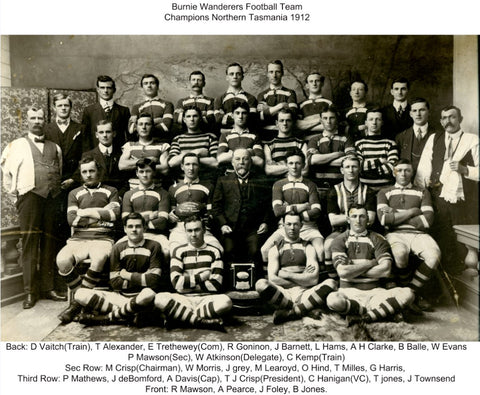1912 Wanderers Football Team - Virtually Won State Premiership

FAMOUS 1912 WANDERERS FOOTBALL TEAM - VIRTUALLY WON STATE PREMIERSHIP (click heading to see original 1950 article)
A Burnie team virtually won the State Football Premiership in 1912.
It was the famous 'Wanderers Eighteen', which is still talked of today by old time football enthusiasts.
Wanderers defeated North Launceston (the northern premier team) at Launceston, and the following Saturday North beat Lefroy, the southern titleholders.
The Wanderers beat Railway for the final of the Burnie League that year.
At Launceston, they downed North Launceston in a hard match.
The following Saturday Wanderers beat Mersey, and North Launceston beat Lefroy.
Wanderers challenged Lefroy to play a state Premiership match either at Hobart, Launceston, or Burnie, but the offer was not accepted.
This was a big disappointment, as at no time previously had a Burnie team beaten the state’s best.
Wanderer’s team, which was formed about 1906, and played in the Burnie League until about 1922, was a really good team when in its prime between 1909 and 1913.
The captain, Arthur Davis, was recognised as one of Tasmania’s best centremen.
“Tat” Hind was the outstanding ruckman of the day, and was on the ball continuously for three and a half quarters in the Launceston match.
J.Foley, who now has the Globe Hotel, Launceston, was a fast and nippy rover.
The team looked for men with pace.
Len Harris, a Burnie Gift winner, was the state’s fastest winger of the day.
A.Pearce, now the ‘Mine Host’ of the Palace Hotel, Devonport, is remembered as Tasmania’s place-kick.
T and B (“Tiger”) Jones, who were then working on the railway line to Wynyard, were good, fast men.
Frank Matthews, now a jeweller at Devonport, was hard to beat as a forward.
Wanderers were noted for their pace and brilliance.
Every man from the six footers to the rovers had to be fast, and the team included several Sheffield winners.
If a player did not turn up to practice at least once a week, he was immediately dropped from the team, no matter how good he is.
Although he is not pictured, Barney Badcock, of Launceston, was playing coach of the side.
Teams were instructed to use all the field, and wing play was employed more in those days.
Instead of passing straight down the centre and getting the ball to the danger zone the shortest way possible, players knew that every man was reliable, and therefore used a lot of zig-zag passing.
Other teams playing in the Burnie League in those days were Railway, Yeoman, Wynyard, and Ridgley.
Home matches were played at South Burnie, and although admittance charges were 6d. to 9d., gates used to average £40.




